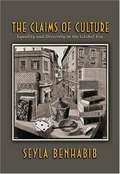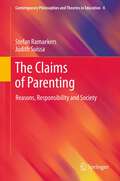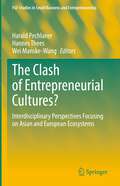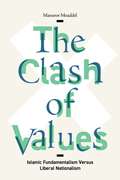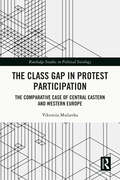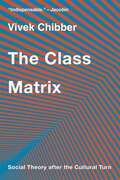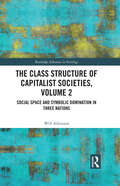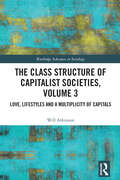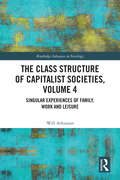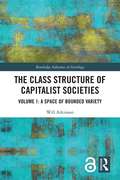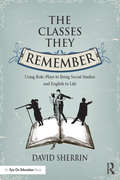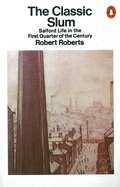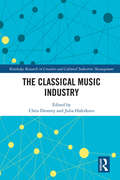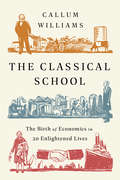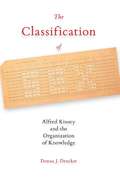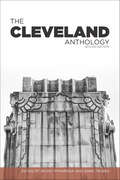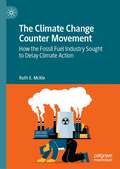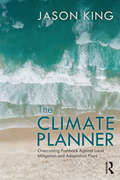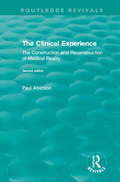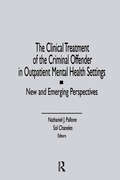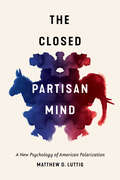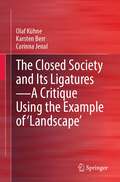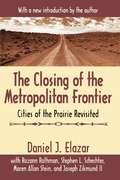- Table View
- List View
The Claims of Culture: Equality and Diversity in the Global Era
by Seyla BenhabibHow can liberal democracy best be realized in a world fraught with conflicting new forms of identity politics and intensifying conflicts over culture? This book brings unparalleled clarity to the contemporary debate over this question. Maintaining that cultures are themselves torn by conflicts about their own boundaries, Seyla Benhabib challenges the assumption shared by many theorists and activists that cultures are clearly defined wholes. She argues that much debate--including that of "strong" multiculturalism, which sees cultures as distinct pieces of a mosaic--is dominated by this faulty belief, one with grave consequences for how we think injustices among groups should be redressed and human diversity achieved. Benhabib masterfully presents an alternative approach, developing an understanding of cultures as continually creating, re-creating, and renegotiating the imagined boundaries between "us" and "them." Drawing on contemporary cultural politics from Western Europe, Canada, and the United States, Benhabib develops a double-track model of deliberative democracy that permits maximum cultural contestation within the official public sphere as well as in and through social movements and the institutions of civil society. Agreeing with political liberals that constitutional and legal universalism should be preserved at the level of polity, she nonetheless contends that such a model is necessary to resolve multicultural conflicts. Analyzing in detail the transformation of citizenship practices in European Union countries, Benhabib concludes that flexible citizenship, certain kinds of legal pluralism and models of institutional powersharing are quite compatible with deliberative democracy, as long as they are in accord with egalitarian reciprocity, voluntary self-ascription, and freedom of exit and association. The Claims of Culture offers invaluable insight to all those, whether students or scholars, lawyers or policymakers, who strive to bridge the gap between the theory and practice of cultural politics in the twenty-first century.
The Claims of Parenting
by Stefan Ramaekers Judith SuissaMany sociological, historical and cultural stories can be and have already been told about why it is that parents in post-industrial, western societies face an often overwhelming array of advice on how to bring up their children. At the same time, there have been several philosophical treatments of the legal, moral and political issues surrounding issues of procreation, the rights of children and the duties of parents, as well as some philosophical accounts of the shifts in our underlying conceptualization of childhood and adult-child relationships. While this book partly builds on the insights of this literature, it is significantly different in that it offers a philosophically-informed discussion of the actual practical experience of being a parent, with its deliberations, judgements and dilemmas. In probing the ethical and conceptual questions suggested by the parent-child relationship, this unique volume demonstrates the irreducible philosophical richness of this relationship and thus provides an important counter-balance to the overly empirical and largely psychological focus of a great deal of "parenting" literature. Unlike other analytic work on the parent-child relationship and the educational role of parents, this work draws on first-person accounts of the day-to-day experience of being a parent in order to explore the ethical and epistemological aspects of this experience. In so doing it exposes the limitations of some of the languages within which contemporary "parenting" is conceptualized and discussed, and opens up a space for thinking about childrearing and the parent-child relationship beyond and other than in terms of the languages which dominate the ways in which we generally think about it today.
The Clash of Entrepreneurial Cultures?: Interdisciplinary Perspectives Focusing on Asian and European Ecosystems (FGF Studies in Small Business and Entrepreneurship)
by Harald Pechlaner Wei Manske-Wang Hannes TheesThis book uncovers the current knowledge on entrepreneurial cultures and the development of entrepreneurial ecosystems between Asia and Europe. Broadening the scope spatially and conceptually, the book discusses the entrepreneurial ecosystems as a system and mediator in their cultural, political, and socio-economic settings in an interdisciplinary approach. This allows a clearer perspective on stakeholders' interaction, international collaboration and competition, power relations, and political influence. The various chapters in this edited volume cover the peculiarities and differences in Asia, Europe, and Eurasia with the New Silk Road (or Belt and Road Initiative) as the bridging component. The chapters, written for researchers and policy makers interested in Asian-European cooperation, also include discussions on economic systems, globalization, and regionalization, politics, cultures, and digitalization.
The Clash of Values: Islamic Fundamentalism Versus Liberal Nationalism
by Mansoor MoaddelMuch of the Middle East and North Africa still appears to be in a transitional period set in motion by the 2011 Arab uprisings, and the political trajectory of the region remains difficult to grasp. In The Clash of Values, Mansoor Moaddel provides groundbreaking empirical data to demonstrate how the collision between Islamic fundamentalism and liberal nationalism explains the region’s present and will determine its future.Analyzing data from over 60,000 face-to-face interviews of nationally representative samples of people in seven countries—Egypt, Iraq, Lebanon, Pakistan, Saudi Arabia, Tunisia, and Turkey—Moaddel reveals the depth and breadth of the conflict of values. He develops measures of expressive individualism, gender equality, secularism, and religious fundamentalism and shows that the factors that strengthen liberal values also weaken fundamentalism. Moaddel highlights longitudinal data showing changes in orientations toward secular politics, Western-type government, religious tolerance, national identity, and to a limited extent gender equality, as well as a significant decline in support for political Islam, over the past decade. Focusing on these trends, he contends that the Arab Spring represents a new phase of collective action rooted in the spread of the belief in individual liberty. Offering a rigorous and deeply researched perspective on social change, The Clash of Values disentangles the Middle East and North Africa’s political complexity and pinpoints a crucial trend toward liberal nationalism.
The Class Gap in Protest Participation: The Comparative Case of Central Eastern and Western Europe (Routledge Studies in Political Sociology)
by Viktoriia MuliavkaThe Class Gap in Protest Participation discusses a theoretically grounded empirical analysis of the relationship between class and protest involvement across Central Eastern and Western Europe.In recent decades, mass protests have surged in both frequency and scale, yet there remains a significant variability in citizen involvement in non-electoral politics across Europe. While affluent Western democracies often witness robust civic engagement, countries of Central and Eastern Europe exhibit comparatively limited political participation. This regional gap is particularly pronounced when examining post-socialist workers who show minimal protest activity. Addressing this phenomenon, the book starts from the following question: Why do workers in Central and Eastern Europe demonstrate disproportionately lower rates of protest engagement compared to their Western European counterparts? The study reveals that the answer lies beyond conventional explanations such as legacies of communism. Cross-regional disparities in working-class protest activism are driven by differences in labor protection and left mobilization capacity. These variations stem from the historical context and the economic dependency of post-socialist countries, which create distinct conditions for workers' political engagement in the core and (semi-)periphery.This book will be of interest to political scientists and sociologists, especially researchers interested in political participation, social inequality, and post-socialist transformations.
The Class Matrix: Social Theory after the Cultural Turn
by Vivek ChibberAn influential sociologist revives materialist explanations of class, while accommodating the best of rival cultural theory. Following the collapse of the Soviet Union, analysis of class and other basic structures of capitalism was sidelined by theorists who argued that social and economic life is reducible to culture—that our choices reflect interpretations of the world around us rather than the limitations imposed by basic material facts. Today, capitalism is back on the agenda, as gross inequalities in wealth and power have pushed scholars to reopen materialist lines of inquiry. But it would be a mistake to pretend that the cultural turn never happened. Vivek Chibber instead engages cultural theory seriously, proposing a fusion of materialism and the most useful insights of its rival. Chibber shows that it is possible to accommodate the main arguments from the cultural turn within a robust materialist framework: one can agree that the making of meaning plays an important role in social agency, while still recognizing the fundamental power of class structure and class formation. Chibber vindicates classical materialism by demonstrating that it in fact accounts for phenomena cultural theorists thought it was powerless to explain. But he also shows that aspects of class are indeed centrally affected by cultural factors. The Class Matrix does not seek to displace culture from the analysis of modern capitalism. Rather, in prose of exemplary clarity, Chibber gives culture its due alongside what Marx called “the dull compulsion of economic relations.”
The Class Structure of Capitalist Societies, Volume 2: Social Space and Symbolic Domination in Three Nations (Routledge Advances in Sociology)
by Will AtkinsonThe second volume of The Class Structure of Capitalist Societies maps the distribution of social powers and associated properties and lifestyles in unparalleled detail by examining the results of a brand-new survey delivered in Sweden, Germany and the US. Continuing the cross-national investigation of the shape and effects of class systems across capitalist nations, the analyses in Volume 2 are embedded in a novel sociological theory of international relations, sustained reflections on the relationship between national standing and class structure and extensive reconstruction of the histories of class in each of the three nations studied. The ultimate conclusion, however, is that not only that the fundamental structure of class today the same across the three cases, for all their unique cultural and historical features, but their translation into differences of taste, practice and symbolic violence, always cross-cut by gender, follow highly familiar patterns too. This volume will appeal to scholars and advanced undergraduate and postgraduate students interested in sociology, politics and demography and is essential reading for all those interested in social class across the globe.
The Class Structure of Capitalist Societies, Volume 3: Love, Lifestyles and a Multiplicity of Capitals (Routledge Advances in Sociology)
by Will AtkinsonThis book continues the Class Structure of Capitalist Societies series by exploring the place of class among a confluence of factors in shaping people’s lives, loves and lifestyles across three nations.Previous volumes in the series examined the shape, history and cultural expressions of class structures. Now, grappling with themes usually put under the labels of ‘intersectionality’ and ‘work-life balance’ and bridging literatures seldom brought together, this volume uses an innovative mix of statistical techniques to untangle the messy nexus of factors – class, age, gender, race/ethnicity, intimate relations, political context and more – underpinning everyday routines, spaces, possessions, practices, (im)possibilities and self-perceptions in the US, Germany and Sweden. In the process it advances the specific vision of class and social relations developed by Pierre Bourdieu, pursuing the case, above all, that conceptual and methodological progress is necessary to fully recognise and explore the multiplicity of desires, dispositions and demands at play in people’s lives.The volume will be of major interest to scholars of class, culture, gender and family but will appeal to anyone interested in the interplay of identities and pressures implicated in contemporary experiences and inequalities.
The Class Structure of Capitalist Societies, Volume 4: Singular Experiences of Family, Work and Leisure (Routledge Advances in Sociology)
by Will AtkinsonThis fourth volume of The Class Structure of Capitalist Societies finishes the series by exploring how class infuses people’s past and present efforts to juggle family, work and leisure.Previous volumes in the series have examined the shape, history and cultural expressions of class structures in capitalist societies as well as their typical intersections with gender, race/ ethnicity, family and more. Now, drawing on in depth interviews with men and women from the US, Sweden and Germany, this instalment endeavours to show how class actually ‘works out’ in people’s biographies and circumstances, and how, thereby, it is given singular form in their lives. Key to understanding how class works and how it is singularised, the book demonstrates, is its interplay with pressures and interests tied up with family, paid employment and leisure. New concepts and tools, it argues, are necessary to accommodate this multiplicity and, as a result, explain people’s lives more fully, advance our understanding of class and even progress the capacities of sociology as a discipline.The volume will be of major interest to scholars of class, family, work, gender and culture, but it will also appeal to anyone interested in social theory and the progress of sociology.
The Class Structure of Capitalist Societies: Volume 1: A Space of Bounded Variety (Routledge Advances in Sociology)
by Will AtkinsonThis first volume of The Class Structure of Capitalist Societies offers a bold and wide-ranging assessment of the shape and effects of class systems across a diverse range of capitalist nations. Plumbing a trove of data and deploying cutting-edge techniques, it carefully maps the distribution of the key sources of power and documents the major convergences and divergences between market societies old and new. Establishing that the multidimensional vision of class proposed decades ago by Pierre Bourdieu appears to hold good throughout Europe, parts of the wider Western world and Eastern Asia, the book goes on to examine a number of significant themes: the relationship between class and occupation; the intersection of class with gender, religion, geography and age; the correspondences between social position and political attitudes; self-positioning in the class structure; and the extent of belief in meritocracy. For all the striking cross-national commonalities, however, the book unearths consistent variations seemingly linked to distinct politico-economic regimes. This title will appeal to scholars and advanced undergraduate and postgraduate students interested in sociology, politics and demography, and is essential reading for all those interested in social class across the globe.
The Classes They Remember: Using Role-plays And Mock Trials To Bring Social Studies And English To Life
by David SherrinLearn how to use role-plays to bring history and literature to life! When students take on the roles of historical or literary figures, they develop a greater understanding of characters’ identities and motivations, and are able to more deeply explore and reflect upon key issues and themes. In this new book from award-winning teacher David Sherrin, you’ll find out how this lively instructional format will make teaching a more immersive, interactive, and memorable experience for your middle school and high school students. The book includes: <P><P> A clear how-to guide to get the most out of role-playing in your class; Ready-made units and lessons to get you started right away, complete with sample scripts, scaffolding worksheets, and assessment rubrics; Templates and step-by-step instructions to help you design your own role-plays. <P><P> The pre-made units, which Sherrin spent years refining in his classroom, cover historical topics such as the rise of Nazi Germany and the Spanish conquest of the Aztecs. You’ll also find fun and interactive role-plays based on literary works like The Pearl and Fences. These lessons will help students at all ability levels to become better communicators, problem-solvers, and creative thinkers.
The Classic Slum: Salford Life in the First Quarter of the Century
by Robert RobertsA study which combines personal reminiscences with careful historical research, the myth of the 'good old days' is summarily dispensed with; Robert Roberts describes the period of his childhood, when the main affect of poverty in Edwardian Salford was degredation, and, despite great resources of human courage, few could escape such a prison.
The Classical Music Industry (Routledge Research in Creative and Cultural Industries Management)
by Chris Dromey Julia HaferkornThis volume brings together academics, executives and practitioners to provide readers with an extensive and authoritative overview of the classical music industry. The central practices, theories and debates that empower and regulate the industry are explored through the lens of classical music-making, business, and associated spheres such as politics, education, media and copyright. The Classical Music Industry maps the industry’s key networks, principles and practices across such sectors as recording, live, management and marketing: essentially, how the cultural and economic practice of classical music is kept mobile and alive. The book examining pathways to professionalism, traditional and new forms of engagement, and the consequences of related issues—ethics, prestige, gender and class—for anyone aspiring to ‘make it’ in the industry today. This book examines a diverse and fast-changing sector that animates deep feelings. The Classical Music Industry acknowledges debates that have long encircled the sector but today have a fresh face, as the industry adjusts to the new economics of funding, policy-making and retail The first volume of its kind, The Classical Music Industry is a significant point of reference and piece of critical scholarship, written for the benefit of practitioners, music-lovers, students and scholars alike offering a balanced and rigorous account of the manifold ways in which the industry operates.
The Classical School: The Birth of Economics in 20 Enlightened Lives
by Callum WilliamsA fascinating chronicle of the lives of 20 economists who played major roles in the evolution of global economic thought.What was Adam Smith really talking about when he mentioned the "invisible hand"? Did Karl Marx really predict the end of capitalism? Did Thomas Malthus (from whose name the word "Malthusian" derives) really believe that famines were desirable?In The Classical School, Callum Williams debunks popular myths about these great economists, and explains the significance of their ideas in an engaging way. After reading this book, you will know much more about the very famous (Smith, Ricardo, Mill) and the not-quite-so-famous (Bernard de Mandeville, Friedrich Engels, Jean-Baptiste Say). The book offers an assessment of what they wrote, the impact it had, and the worthiness of their ideas. It's far from the final word on any of these people, but a useful way of understanding what they were all about, at a time when understanding these economic giants is perhaps more important than ever.
The Classification Of Sex: Alfred Kinsey And The Organization Of Knowledge
by Donna DruckerAlfred C. Kinsey’s revolutionary studies of human sexual behavior are world-renowned. His meticulous methods of data collection, from comprehensive entomological assemblies to personal sex history interviews, raised the bar for empirical evidence to an entirely new level. In The Classification of Sex, Donna J. Drucker presents an original analysis of Kinsey’s scientific career in order to uncover the roots of his research methods. She describes how his enduring interest as an entomologist and biologist in the compilation and organization of mass data sets structured each of his classification projects. As Drucker shows, Kinsey’s lifelong mission was to find scientific truth in numbers and through observation—and to record without prejudice in the spirit of a true taxonomist. <p><p> Kinsey’s doctoral work included extensive research of the gall wasp, where he gathered and recorded variations in over six million specimens. His classification and reclassification of Cynips led to the speciation of the genus that remains today. During his graduate training, Kinsey developed a strong interest in evolution and the links between entomological and human behavior studies. In 1920, he joined Indiana University as a professor in zoology, and soon published an introductory text on biology, followed by a coauthored field guide to edible wild plants. <p> In 1938, Kinsey began teaching a noncredit course on marriage, where he openly discussed sexual behavior and espoused equal opportunity for orgasmic satisfaction in marital relationships. Soon after, he began gathering case histories of sexual behavior. As a pioneer in the nascent field of sexology, Kinsey saw that the key to its cogency was grounded in observation combined with the collection and classification of mass data. To support the institutionalization of his work, he cofounded the Institute for Sex Research at Indiana University in 1947. He and his staff eventually conducted over eighteen thousand personal interviews about sexual behavior, and in 1948 he published Sexual Behavior in the Human Male, to be followed in 1953 by Sexual Behavior in the Human Female. <p> As Drucker’s study shows, Kinsey’s scientific rigor and his early use of data recording methods and observational studies were unparalleled in his field. Those practices shaped his entire career and produced a wellspring of new information, whether he was studying gall wasp wings, writing biology textbooks, tracing patterns of evolution, or developing a universal theory of human sexuality.
The Clergy in the Medieval World:
by Julia BarrowUnlike monks and nuns, clergy have hitherto been sidelined in accounts of the Middle Ages, but they played an important role in medieval society. This first broad-ranging study in English of the secular clergy examines how ordination provided a framework for clerical life-cycles and outlines the influence exerted on secular clergy by monastic ideals before tracing typical career paths for clerics. Concentrating on northern France, England and Germany in the period c. 800 1200, Julia Barrow explores how entry into the clergy usually occurred in childhood, with parents making decisions for their sons, although other relatives, chiefly clerical uncles, were also influential. By comparing two main types of family structure, Barrow supplies an explanation of why Gregorian reformers faced little serious opposition in demanding an end to clerical marriage in the eleventh and twelfth centuries. Changes in educational provision c. 1100 also help to explain growing social and geographical mobility among clerics. "
The Cleveland Anthology (Belt City Anthologies)
by Anne Trubek Richey PiiparinenA literary snapshot written by the city&’s citizens that serves as an intimate reminder &“that strength of character abounds in the Cleveland community&” (Freshwater Cleveland). The past few years have been full of stories about Cleveland&’s ongoing revitalization and renewal, mostly from people from outside the city. This collection of essays, photographs, and poems offers an insiders&’ view, telling the story of the city as it actually exists on the ground. Citizens of Cleveland will connect to the experiences and locales detailed here. Readers from outside the area will gain invaluable insight into what it means to live in here, why the city is loved or hated, and why some people obsess over it. The collection looks at popular Cleveland attractions like Harvey Pekar and the Cuyahoga River, but also looks at life on the Number 9 bus and the delis of Slavic Village. Through photographs, essays, and poetry, the collection questions the notion of &“Rust Belt Chic&” and the truth behind that statement. It includes contributions by: David C. Barnett, Sean Decatur, Mansfield Frazier, David Giffels, Alissa Nutting, Jim Roakakis, Connie Schultz, and many more. A wide-ranging portrait of a city of contradictions, written by those who have lived the story. &“Touching always on the idea of a post-industrial landscape as a form of innate and historical beauty and integrity, this book creates a genuine and intimate look at Cleveland. Those who hail from &“rust belt&” cities like Pittsburgh, Detroit, and Milwaukee will find a special place in their hearts for this book.&” —Riffle NonFiction
The Climate Change Counter Movement: How the Fossil Fuel Industry Sought to Delay Climate Action
by Ruth E. McKieThis book provides an historical account of the emergence and spread of the climate change counter movement across the globe. Drawing on an extensive database developed by the author, the book recounts the development of an international network, taking the reader on a journey through the history of the movement before looking closely at a series of comparative case studies examining movement organisations in different countries.
The Climate Planner: Overcoming Pushback Against Local Mitigation and Adaptation Plans
by Jason KingThe Climate Planner is about overcoming the objections to climate change mitigation and adaption that urban planners face at a local level. It shows how to draft climate plans that encounter less resistance because they involve the public, stakeholders, and decisionmakers in a way that builds trust, creates consensus, and leads to implementation. Although focused on the local level, this book discusses climate basics such as carbon dioxide levels in the atmosphere, the Intergovernmental Panel on Climate Change, the Paris Agreement of 2015, worldwide energy generation forecasts, and other items of global concern in order to familiarize urban planners and citizen planners with key concepts that they will need to know in order to be able to host climate conversations at the local level. The many case studies from around the United States of America show how communities have encountered pushback and bridged the implementation gap, the gap between plan and reality, thanks to a commitment to substantive public engagement. The book is written for urban planners, local activists, journalists, elected or appointed representatives, and the average citizen worried about climate breakdown and interested in working to reshape the built environment.
The Climate of Workplace Relations (Routledge Revivals)
by Paul Blyton Ali Dastmalchian Ray AdamsonFirst published in 1991, this book investigates not only the processes of industrial relations themselves but also the climate in which they work. As well as studying union behaviour, it views the topic from the wider perspective of human resource management and integrates theories of industrial relations and organizational analysis. The extensive empirical evidence presented, which draws on manufacturing and service industries in Canada, is used to examine such areas as cooperation between union and management, employee perceptions and corporate culture. This interesting reissue will be of importance to all those studying the dynamics of organizations and industrial relations processes, and ways in which a productive climate can be established and maintained.
The Clinical Experience, Second edition: The Construction and Reconstrucion of Medical Reality (Routledge Revivals)
by Paul AtkinsonThis second edition, published in 1997 follows the original edition from 1981 which was the only published ethnography of medical education in the UK. The theoretical, methodological and substantive issues continue to be of importance to the sociology and anthropology of medicine and medical knowledge. Indeed, critiques of contemporary ‘biomedicine’ and the growing interest in the sociology of the body have made its central concerns of even greater significance than when the first edition was published. Covering topics including the clinical tradition, the social distribution of bedside knowledge, reproducing disease, and the clinical setting, this expanded edition builds on the success of the first and will interest researchers and clinicians in the fields of sociology, anthropology and medicine. This book was originally published as part of the Cardiff Papers in Qualitative Research series edited by Paul Atkinson, Sara Delamont and Amanda Coffey. The series publishes original sociological research that reflects the tradition of qualitative and ethnographic inquiry developed at Cardiff. The series includes monographs reporting on empirical research, edited collections focussing on particular themes, and texts discussing methodological developments and issues.
The Clinical Treatment of the Criminal Offender in Outpatient Mental Health Settings: New and Emerging Perspectives
by Letitia C PalloneThis volume brings together in a single source a set of perspectives by leaders in the clinical treatment of criminal offenders in outpatient settings, particularly those whose crimes have involved domestic violence and/or substance abuse. More than a set of “how to” techniques, it addresses the question of which offenders can successfully be treated in what settings by which techniques. It is a valuable resource not only for those concerned with prisons, probation, and parole, but also for those responsible for the delivery of mental health services in the community.
The Closed Partisan Mind: A New Psychology of American Polarization
by Matthew D. LuttigThe Closed Partisan Mind traces the roots of partisan polarization to psychological closed-mindedness in the electorate and the changing perception of politics created by polarized political leaders and the new media environment. American politics today can be defined by the intense and increasingly toxic divide between Democrats and Republicans. Matthew D. Luttig explores why so many Americans have endorsed this level of political conflict.Luttig illustrates how the psychological need for closure leads people, regardless of whether they identify as Democrat or Republican, to express more polarized political attitudes. This association between closed minds and partisan polarization is a new phenomenon and can be traced to broader changes in American society, such as the creation of ideologically distinct political parties and a fragmented media environment. These developments have simplified politics into a black-or-white, us-versus-them conflict—making politics appeal to those with closed minds. Today, strong partisans do not just cheer for their political party to win elections. Instead, more akin to religious true believers, strong partisans use their affiliation as a means of understanding right and wrong, friend and enemy, true and false. The Closed Partisan Mind reveals that these dynamics have manifested in both a new type of partisanship and a new type of partisan. The emergence of this new closed partisanship illustrates the dangers that polarization has wrought on society, politics, and the minds of Americans.
The Closed Society and Its Ligatures—A Critique Using the Example of 'Landscape'
by Olaf Kühne Corinna Jenal Karsten BerrIn the face of great challenges, utopian thinking is currently in vogue. The fact that utopias, with their ideas of an idealized target society, are not compatible with the basic features of an Open Society was already pointed out by Karl Popper in his book 'Die Offene Gesellschaft und ihre Feinde' (The Open Society and its Enemies) under the impression of National Socialism and Stalinism. In the present book, further forms of Closed Societies and the principal similarities (and differences) of their construction are examined. This is done by drawing on Ralf Dahrendorf's concept of life chances, in which he deals with the interaction of options and ligatures. The ambivalence of Dahrendorf's understanding of ligatures, since they restrict options on the one hand, but also give them meaning on the other, is resolved by a threefold differentiation: into ethical and moral, internally and externally directed, and explicit and implicit ligatures. While the former are capable of enabling life chances, the latter tend to limit them. Based on this, the authors elaborate on the landscape (side) consequences of various closed societies and how ill-suited they are for dealing with current challenges.
The Closing of the Metropolitan Frontier: Cities of the Prairie Revisited
by Daniel ElazarThe period from the mid-1960s to the early 1980s signaled the end of the prosperity of the postwar years enjoyed by the cities of the prairie-those cities located immediately within or adjacent to the Mississippi River drainage system, or what is usually called the American Heartland. During this period, the bottom dropped out of local economies and all collapsed except those upheld by massive state institutions. With this collapse, optimism for new opportunities ended, signaling the close of the American frontier.The Closing of the Metropolitan Frontier looks at mid-sized cities Champaign-Urbana, Decatur, Joliet, Moline, Peoria, Rockford, Rock Island, and Springfield, Illinois; Davenport, Iowa; Duluth, Minnesota; and Pueblo, Colorado. Elazar examines how they adapted to change during the period immediately after World War II, through the Vietnam War, and the Nixon years. He considers the roles of federal and state governments as instruments of change including their efforts to impose new standards and ways of doing business. The Closing of the Metropolitan Frontier analyzes the struggle between federalism and managerialism in the local political arena.In his new introduction, Daniel J. Elazar discusses this volume's place as part of a forty-year study of the cities of the prairie as well as the changes and developments in that region over that forty-year span. This volume will be of great interest to economists, political scientists, and sociologists interested in the Great Society and the New Federalism and their aftermath.
